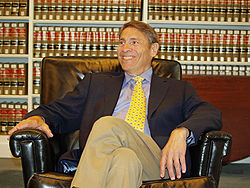- Michael E. Levine
-
Michael E. Levine (Born New York, NY, United States) is a "Distinguished Research Scholar" at the New York University School of Law. He has been involved in the world of air transportation and its regulation as a senior airline executive, an academic and a government official. He retired from Northwest Airlines in 1999 to return to academic life.
Contents
Background
Levine holds a BA degree from Reed College (1962) and an LLB degree from Yale Law School (1965). He did graduate work in economics at Yale and the University of Chicago.
Airline executive
As an airline executive, Levine served at Continental Airlines (1981–82) and Northwest (1992–99) as an Executive Vice President and was President and CEO of New York Air (1982–84), guiding that post-deregulation airline to its first profit.[1] At Northwest, he was principally responsible for the commercial strategy and activities of the company, and for developing and executing Northwest's pioneering alliance strategy, including its joint venture with KLM and its alliance with Continental. At Continental, he had similarly broad responsibilities and was principally responsible for the realignment of its Micronesian system to serve Japan.
Academic
As an academic, he was an early advocate of interdisciplinary studies in law and economics and political science. A student of Nobel laureate Ronald H. Coase at the University of Chicago and of Robert H. Bork, Ward S. Bowman and Friedrich Kessler at Yale, Levine established an innovative program in law and social sciences at Caltech and U.S.C., while holding professorships at both institutions. He served as Dean of the Yale School of Management (1988–92) and held professorial chairs at Caltech, Yale and USC. He has also been a member of the law faculties at Harvard (1999–2002) and Yale (2002–2005) and has been an academic visitor at MIT, the London School of Economics and Duke University. Levine has done pioneering research on airline deregulation, on the application of market mechanisms to airport congestion, on committees and agendas and on the origins of regulation and the behavior of regulatory agencies.
Government
As a government official, Levine was instrumental in bringing about airline deregulation. In 1978 and 1979, he served as General Director, International and Domestic Aviation, (the senior staff position at the U.S. Civil Aeronautics Board) and devised many of the mechanisms and practices used to deregulate the industry.
Recognition
Levine has received recognition of his work. He was named among the ten most influential pioneers in the history of commercial aviation by Airfinance Journal, has received the Transportation Research Foundation’s Distinguished Transportation Researcher award for lifetime achievement, and was the recipient of the Civil Aeronautics Board’s Distinguished Service Award.
Controversy
Levine's deanship generated some controversy that was covered fairly extensively by the media. When Levine became dean, Yale's SOM was unable to attract a dean with a national reputation. President Schmidt was under pressure from the Yale Corporation to change it or close it. He recruited Levine, a regularly appointed holder of a professorial chair who was already a member of the SOM faculty, as dean. Together, they took actions designed to save the school and succeeded in doing so. Those changes infuriated faculty, although they were supported by many of the school's most prominent scholars. The aggrieved faculty and some student and alumni supporters protested the changes publicly.
No faculty contracts were terminated before they expired and no appointments or curriculum changes were made without faculty vote.
References
- ^ PILOTING NEW YORK AIR OUT OF THE RED, New York Times, December 25, 1983, By AGIS SALPUKAS
Categories:- 1941 births
- Living people
- American businesspeople
- American chief executives
- Harvard Law School faculty
- New York University faculty
- Yale Law School alumni
- Yale Law School faculty
- Duke University faculty
- Reed College alumni
Wikimedia Foundation. 2010.

